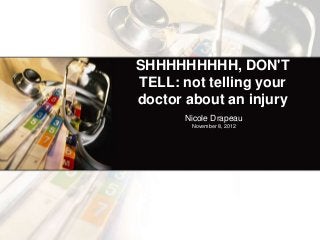
Shhhhhhhhh, don't tell two
- 1. SHHHHHHHHH, DON'T TELL: not telling your doctor about an injury Nicole Drapeau November 8, 2012
- 2. Brief overview of the case • Mr. Baxter fell at work and was Doctor ordered 9 sessions of Physical Therapy. • One month later his back hurt again and was Doctor ordered 9 more sessions of physical therapy. • On his third session, he told his physical therapist, Ms. Nye, that he fell while coaching a soccer game but was sure he’d been feeling pains shortly before that. • Baxter doesn’t mention second fall to his doctor. • On his fifth session, his pain has increased and now includes his left leg. Nye believes his pain is different than before. • Baxter still doesn’t tell doctor about second fall. • On his seventh session, he has weakness and numbness in his leg and is fatigued. Nye strongly suggests he tell his doctor or that she can. • He refuses to tell doctor and tells her not to either.
- 3. What is the main question relating to: Medical or Bioethics? • The main question in this case relates to medical. • The doctor originally prescribed a course of treatment for a specific injury. • Now that a possible new injury has occurred, the doctor needs to be informed in order to make a new medical diagnosis. • This will allow the patient to receive the best treatment possible.
- 4. Contributing factors to complexity • Baxter fell again, which means he could have reinjured his old injury or caused a new injury to himself. • By not telling his doctor about his latest fall, no one knows what his true injury is. • In continuing physical therapy treatment for an old injury, he could inadvertently be causing more injury to himself by getting the wrong type of treatment. • Upon hearing that Baxter had fallen again, but had not informed his doctor, should Nye have made a note about it to the doctor initially? • After realizing that Baxter's pain was different, should Nye have told the doctor or refused therapy treatment until the doctor was informed?
- 5. Conflicts about case? • There were no major conflicts of opinion between me and the people I talked with. • We all thought it was possible that Baxter had caused a new injury to himself. • We agreed that he should have informed his doctor, especially after it was mentioned by Nye. • We also thought that after Nye heard he was not telling his doctor and realized his pain was different, she should’ve, at least, made a note to the doctor. • We also thought that, because Nye waited and made no note, it was still her duty to say something to doctor even after Baxter told her not to. That it wasn’t his call to make for her.
- 6. What could Healthcare Workers do differently? • For starters, Nye could have made a note to the doctor after hearing that he was unaware of Baxter’s second fall. • By making the note, it would’ve allowed for the doctor to reassess Baxter's injury and prescribe a new treatment, should it be necessary. • If, after realizing there was a change in pain and the doctor was still unaware of the second fall, Nye could have opted to make a note of it if Baxter still refused to do so. • By continuing treatment with a pain change, and an unwillingness by Baxter to tell the doctor, Nye could also refuse any further physical therapy until the situation was rectified.
- 7. How would I deal with this case? • I think that if I were in Nye’s position, I would have started out in a similar way to her. I would've asked if Baxter had informed the doctor. If he said no, I would've told him that he should. I probably wouldn’t make a note about it until our next session, if I found out he had still not mentioned it to his doctor. I would've told him that further physical therapy would be postponed until he had spoken to his doctor to prevent accidental injury.